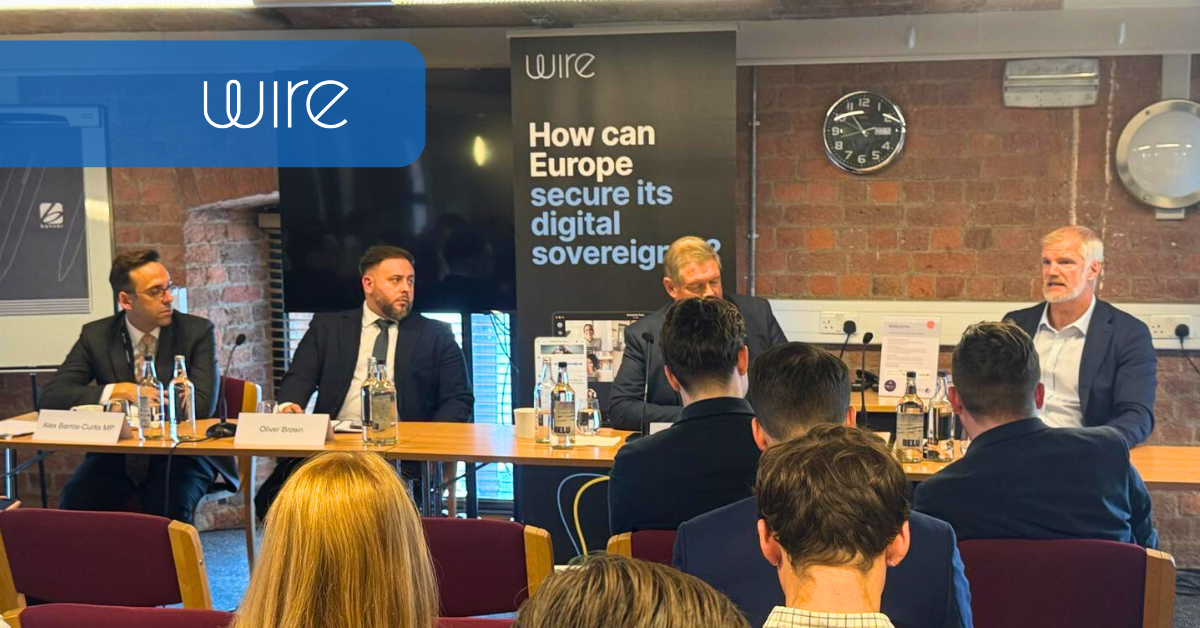At this year’s Labour Party Conference in Liverpool, Wire hosted a high-level panel on Britain’s digital future, exploring how the UK and Europe can strengthen digital sovereignty and resilience in a rapidly changing geopolitical landscape.
The session, chaired by Jon Craig, Chief Political Correspondent at Sky News, brought together Alex Barros-Curtis MP, Al Carns MP, Parliamentary Under-Secretary of State for the Armed Forces, and Oliver Brown, Vice President Commercial at Wire.
The discussion centred on the UK’s role in shaping a sovereign digital ecosystem balancing global partnerships with national control, and aligning regulation, procurement, and innovation to achieve long-term autonomy.
Drawing on insights from the Wire 2025 European Sovereignty Survey, Oliver Brown highlighted that while 84% of technology and policy leaders view digital sovereignty as a top priority, only 16% believe Europe will achieve it within five years.
- 84.2% see end-to-end encryption as essential to sovereignty.
- 63.2% consider open-source software critical.
- 47.4% cite reducing dependence on US vendors as a strategic goal.
Citing Forrester research, the panel discussed how more than half of public cloud decision-makers view regulatory constraints as barriers to adoption, yet 84% now consider sovereignty a defining factor in vendor selection.
“We’re very good with NIS2, DORA and GDPR, but we don’t execute and enable organisations from a procurement perspective to mandate that investment,” said Oliver Brown, VP Commercial at Wire. “Regulations should come second.”
He called for procurement reform to move regulation from policy to practice enabling organisations to choose sovereign, secure-by-design technologies.
Al Carns MP provided new details on the UK government’s BritCard initiative, confirming that the veterans’ ID card will serve as its first stage. The BritCard aims to allow citizens to verify their identity securely when accessing work, public services, and government platforms.
Alex Barros-Curtis MP closed by emphasising the importance of trust, transparency, and responsible innovation ensuring that digital transformation protects citizens as much as it empowers business.
Key Takeaways
- From policy to execution: Europe’s challenge is not regulation but implementation. Strong frameworks exist, but dependencies persist.
- Procurement as policy: Reforming how governments buy technology is key to driving sovereignty in practice.
- Secure foundations: End-to-end encryption, open-source software, and regional data hosting are non-negotiable pillars of digital autonomy.
- Digital identity evolution: The BritCard rollout signals an early move toward trusted, sovereign digital identity for UK citizens.
- Shared responsibility: Lasting resilience will depend on close cooperation between government, industry, and European technology providers like Wire.
The conversation underscored a shared understanding: sovereignty is no longer just a policy discussion, it's a design decision. Wire remains committed to helping governments and enterprises build secure, compliant, and sovereign communication infrastructures designed and operated in Europe.
